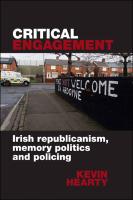Critical engagement
Irish republicanism, memory politics and policing
Author(s)
Hearty, Kevin
Collection
Knowledge Unlatched (KU)Number
104097Language
EnglishAbstract
This book represents the first interdisciplinary study of how memory has driven and challenged the political transition of Irish republicanism from armed conflict to constitutional politics through endorsing policing and the rule of law in the North of Ireland. Locating itself within memory studies, critical criminology and transitional justice, this book uses original interviews with political activists, community workers and former combatants from across the spectrum of modern Irish republicanism to draw out how the past frames internal tensions within the Irish republican constituency as those traditionally opposed to state policing structures opt to buy into them as part of a wider transitional process in post-conflict Northern Ireland. The book critiques the challenges of making peace with the enemy against a backdrop of communal narratives and memories of historic injustice, counterinsurgency policing and human rights abuse that do not simply disappear when war turns to peace. Through a rich empirical basis the book offers an insight into these challenges from the perspective of those who were, and remain, in the thick of the Irish republican debate on policing. In doing so it provides an acute insight into the role that individual and collective memory plays in reshaping ideological outlooks, understanding processes of political transition, contextualising ‘moving on’ processes with former enemies and conditioning views of post-conflict police reform.
Keywords
History; Europe; Great Britain; GeneralDOI
https://doi.org/10.2307/j.ctt1ps31x5ISBN
9781786948281Publisher
Liverpool University PressPublisher website
https://www.liverpooluniversitypress.co.uk/Publication date and place
2017Grantor
Imprint
Liverpool University PressClassification
European history


 Download
Download